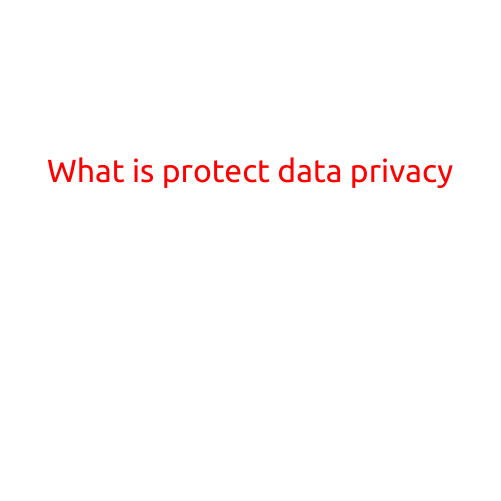
What is Data Privacy and Why is it So Important?
In today’s digital age, the amount of personal data we share online is staggering. With every swipe, click, and like, we’re generating a trail of digital footprints that can be used to identify and track us. As a result, data privacy has become a pressing concern for individuals, businesses, and governments alike. In this article, we’ll explore what data privacy is, why it’s essential, and what we can do to protect our private information.
What is Data Privacy?
Data privacy refers to the protection of personal and sensitive information from unauthorized access, use, and disclosure. It encompasses the rights of individuals to control how their personal data is collected, stored, and shared, as well as the obligations of organizations to keep this information confidential.
Why is Data Privacy Important?
Data privacy is crucial for several reasons:
- Protection against Identity Theft: With sensitive information in the wrong hands, you’re at risk of identity theft, financial fraud, and other forms of exploitation.
- Prevention of Misuse: Personal data can be used to manipulate public opinion, influence political decisions, or compromise national security.
- Protection of Confidential Information: Data privacy ensures that sensitive information, such as health records, financial information, and personal communications, remains confidential.
- Trust and Reputation: Breaches of data privacy can damage an organization’s reputation and erode public trust.
How Can We Protect Our Data Privacy?
- Be Mindful of Online Behavior: Only provide personal information when necessary, and be cautious when sharing sensitive data online.
- Use Strong Passwords: Choose unique, complex passwords and keep them confidential to prevent unauthorized access.
- Keep Software and Systems Up-to-Date: Regularly update operating systems, browsers, and software to ensure you have the latest security patches.
- Use Encryption: Use encryption to protect sensitive information, such as email and online transactions.
- Monitor Credit Reports: Regularly check credit reports to detect potential fraud and identity theft.
- Understand Privacy Policies: Read and understand the privacy policies of organizations you interact with online.
- Use Trusted VPNs: Use Virtual Private Networks (VPNs) when accessing public Wi-Fi networks to encrypt data.
- Report Data Breaches: Notify authorities and organizations of any data breaches or suspicious activity.
Conclusion
Data privacy is a critical issue that demands attention and action. By understanding what data privacy is, why it’s important, and taking steps to protect our personal information, we can safeguard our digital well-being and ensure the trust of others. Remember, every small step counts in the fight against data privacy breaches.





